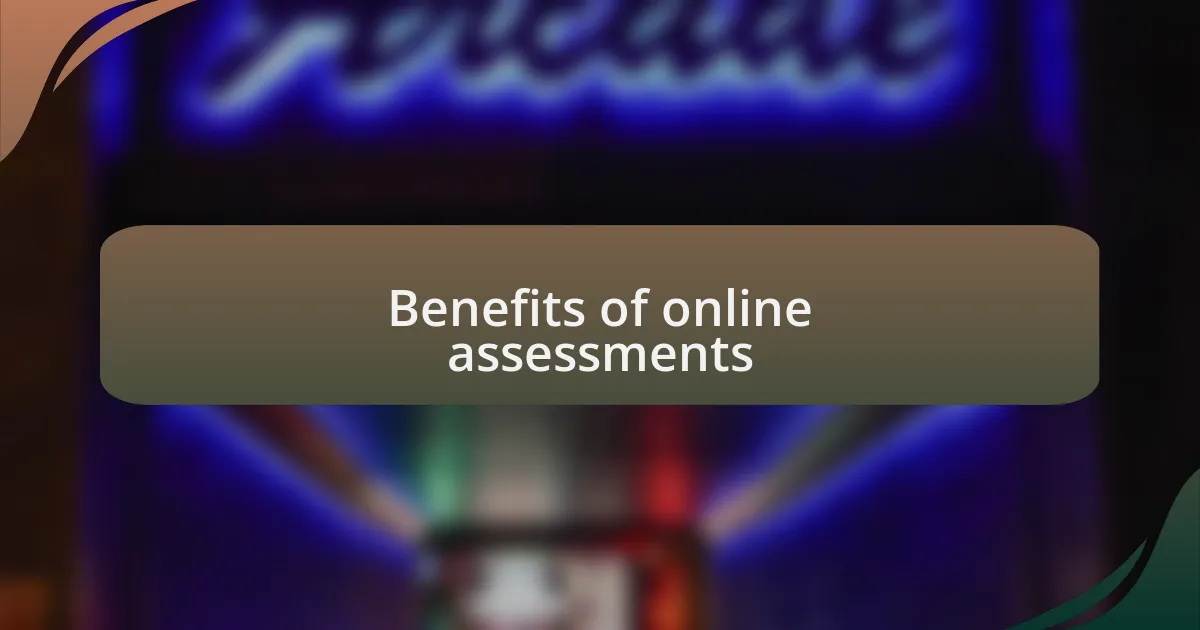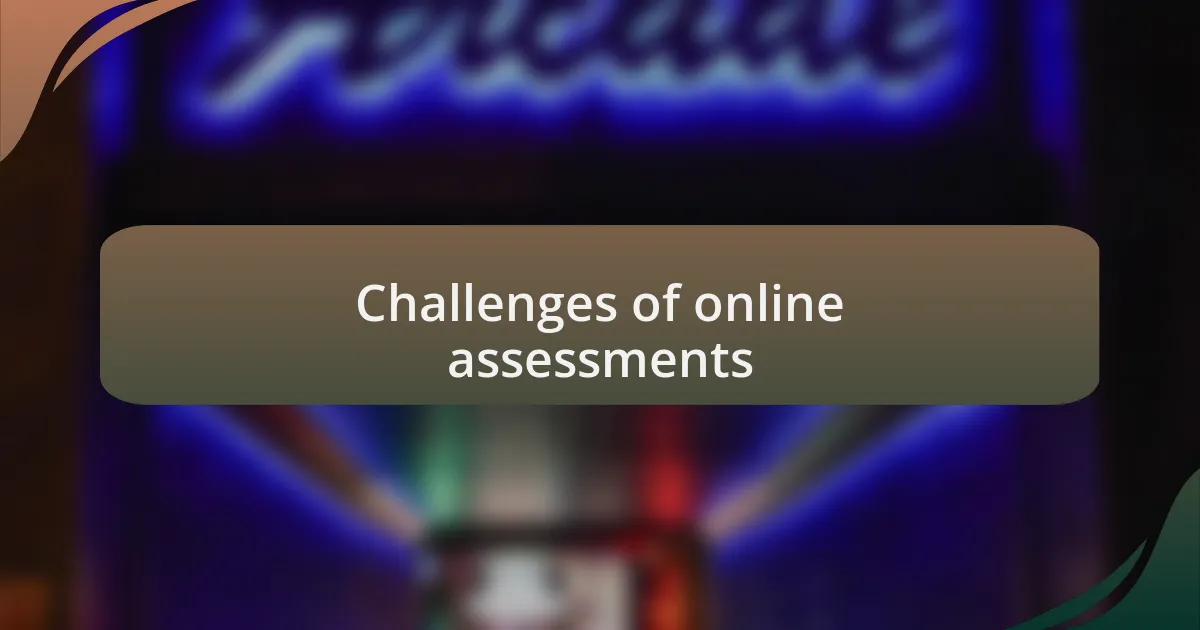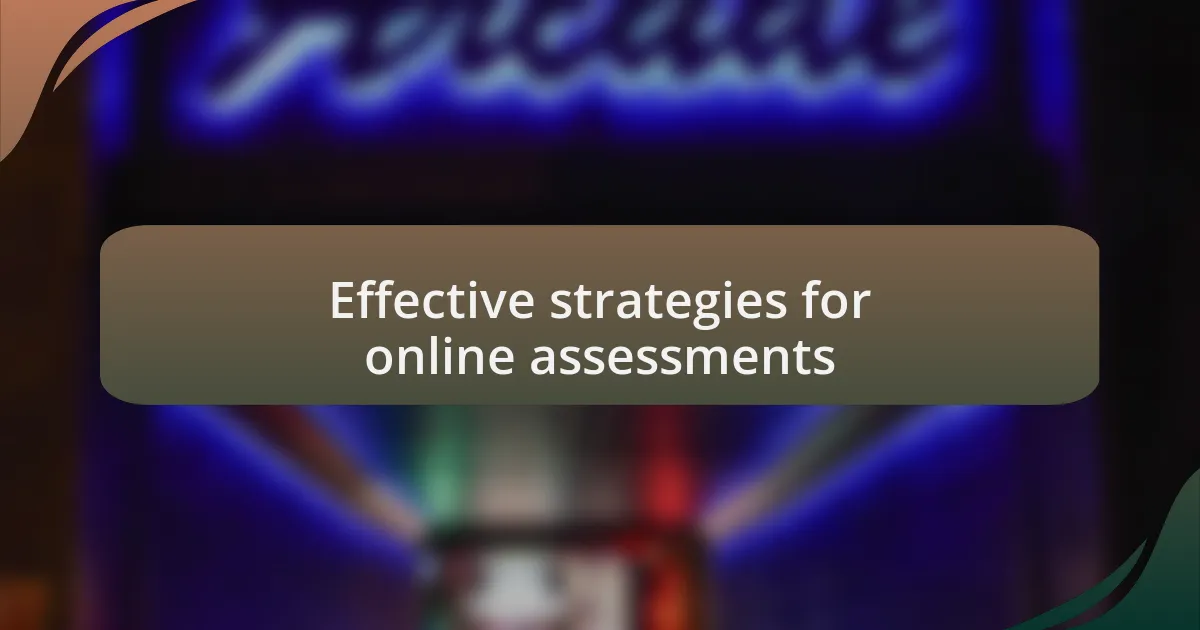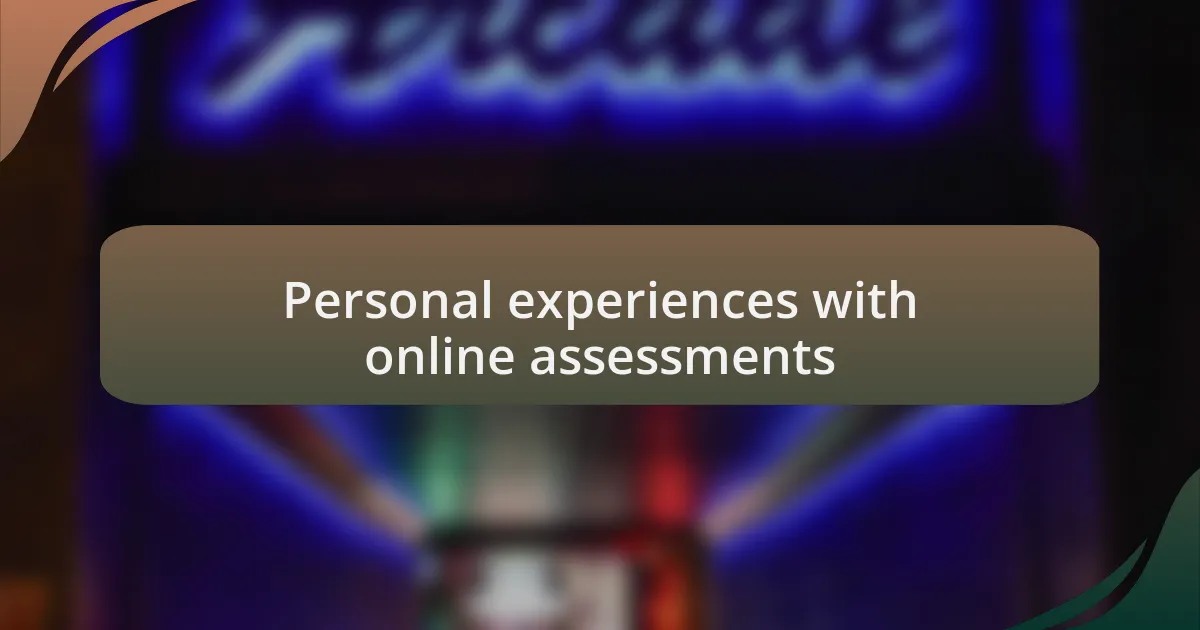Key takeaways:
- Online assessments offer flexibility, immediate feedback, and accessibility, particularly benefiting students in remote areas.
- Challenges include technical difficulties, lack of personal interaction, and potential loss of motivation without a sense of community.
- Effective strategies include creating a dedicated study space, fostering online collaboration, and embracing diverse assessment formats to enhance engagement.
- Personal experiences highlight the importance of managing anxiety, expressing creativity, and valuing constructive feedback in the learning process.

Benefits of online assessments
One of the standout benefits of online assessments is the flexibility they offer. I remember a time when I had to complete a music theory exam, and being able to take it at my own pace made a huge difference. It allowed me to review the material thoroughly without the pressure of a ticking clock hanging over me.
Online assessments also open up opportunities for immediate feedback, which can be a game-changer in music education. I can recall feeling a wave of relief when I received instant results after a vocal performance review. This immediate response not only helped me understand my strengths and weaknesses right away, but it also kept me motivated to improve.
Another significant advantage is the accessibility that online assessments provide. I often think about students in remote areas who may not have access to traditional music teachers. Through these assessments, they can showcase their skills and receive validation on their progress, regardless of where they live. Isn’t it inspiring to think that technology can bridge such gaps in education?

Challenges of online assessments
The challenges of online assessments can sometimes be a bit overwhelming. I vividly recall a time when I faced technical difficulties right before an important composition submission. The stress of experiencing a last-minute system crash left me feeling frustrated and underprepared. It’s moments like these that remind me how crucial a reliable platform is, and they can really throw a wrench in the assessment process.
Another hurdle arises from the lack of personal interaction in an online setting. I still remember how much I valued the immediate feedback from an in-person critique during a performance. The nuances of a teacher’s expression or a peer’s encouragement can provide context that a digital assessment simply cannot replicate. Can a typed comment ever truly convey the same warmth or insight as face-to-face feedback? I have my doubts.
Moreover, the motivation to engage with online assessments can wane when the personal connection is lost. I often find myself asking: how do I stay inspired when studying alone? In a traditional classroom, the camaraderie and shared experiences drive us to push each other. Without that dynamic, it can be hard to maintain the same level of dedication, especially when times get tough. What strategies can we adopt to cultivate that sense of community even in an online environment? That’s something I’m still trying to figure out.

Effective strategies for online assessments
One effective strategy I’ve found for online assessments is creating a dedicated study space that mimics the vibe of a physical classroom. I remember a time when I transformed a corner of my living room into a mini-music studio, complete with my favorite posters and lighting. This simple change made it easier to focus and feel connected to my learning. Have you ever noticed how a change in environment can shift your mindset?
Another tactic that has worked wonders for me is to foster online collaboration. I started a virtual study group with peers where we critique each other’s submitted works. Just last week, we had a lively session where one friend’s unique approach to a scoring assignment opened my eyes to different techniques. It’s fascinating how sharing ideas not only enhances our understanding but also makes the assessment process feel less isolating.
Lastly, embracing a variety of assessment types, like creative projects or audio submissions, can breathe life into the online experience. I once submitted a recorded performance instead of a typical paper, and the rush of creating something uniquely expressive felt liberating. It made me question: why stick to traditional formats when innovation can enhance both engagement and learning? This flexibility could be the key to embracing online assessments fully.

Personal experiences with online assessments
When I first encountered online assessments, I was initially overwhelmed by the format. I remember sitting in front of my computer, feeling the pressure of a ticking clock during a timed test on music theory. It was unsettling, but I learned to manage that anxiety by practicing mindfulness techniques beforehand, which not only quelled my nerves but also sharpened my focus. Have you ever tried to calm your mind before a big test?
Another memorable experience occurred during a composition assessment, where the guidelines allowed for improvisation alongside written work. I had the chance to express myself authentically, pouring my emotions into a piece that reflected my personal journey through music. That moment of creative freedom was exhilarating; it reminded me that assessments don’t always have to be rigid. Isn’t it amazing how a little flexibility can transform a daunting task into a delightful expression of self?
Finally, I’ve found that utilizing feedback from instructors within the online assessment framework has been invaluable. Early on, I submitted a project that I thought was solid, but my teacher pointed out areas for improvement that I wouldn’t have noticed on my own. That experience opened my eyes to the benefits of constructive criticism—it’s not just feedback; it’s a vital part of the learning process. Have you ever realized how pivotal feedback can be in enhancing your skills?